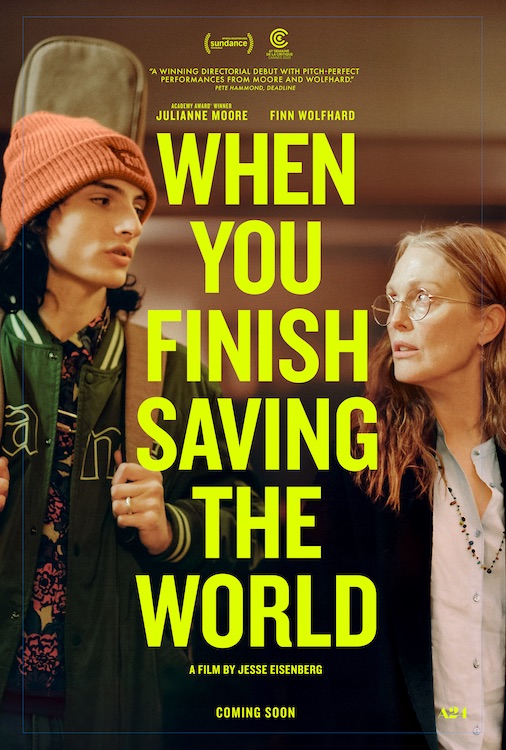
Movie Review: When You Finish Saving the World
What We Liked
What We Didn't Like
If you didn’t know that Jesse Eisenberg wrote and directed When You Finish Saving the World, its characters’ mile-a-minute musings might quickly clue you in. Eisenberg’s directorial debut, based on an Audible drama also penned by him, channels the actor’s constantly churning energy and neuroticism, but it’s failed by a pat script that never quite understands its characters.
Julianne Moore stars as Evelyn, the director of a shelter for domestic violence victims. Evelyn is serious, proudly liberal and deeply intellectual, so focused on the many needs of the world that smiling seems to be a luxury for her. The film focuses on the growing distance with her son Ziggy (Finn Wolfhard), who has no higher aspiration than to write and perform songs for a YouTube audience of 20,000 followers; the only thing he seems to enjoy more is to tell people that he has 20,000 followers. When Ziggy hopes to impress a deeply political girl at school – even though his own political understanding seems to be “politicians are bad” – Ziggy reaches out to his mom, but she’s already turned her sights on a young man at her facility who she can begin molding into her own image.
Moore is largely incapable of giving a bad performance, and understands the passion in Evelyn’s endeavors while also realizing that the character’s a bit unbearable. She’s fueled by pride; simple questions prompt answers that could be college lectures, and she proudly flaunts her Smart car and love of classical music. When she gets home, there’s almost immediately a glass of wine in her hand, and as much as she truly believes in making the world a better place, she’s more invested in making sure people know that she’s the one driving the progress. The character’s a stereotype of the hyper-intellectual modern liberal, but from a place of affection. Moore keeps Evelyn’s humanity in focus; there are hints in her eyes that she knows how isolated she is from the rest of the world, and the way she lights up when she gets to share an Ethiopian meal with a friend reminds us that few actors possess a more powerful smile.
Likewise, Wolfhard, best known for his work on Stranger Things, finds the balance between airhead parody and genuine youthful ignorance as Ziggy. He’s just as self-absorbed as his mother, and any desire he has to broaden his horizons is rooted in impressing others or furthering his brand. In many ways, he’s the opposite of his mother – he’s creative and good at connecting with people, while Evelyn is analytical and unskilled with making small talk with anyone who doesn’t share her intellect. But both characters are similarly shallow, fueled by the same narcissism. Is it their conflicting interests that put a wedge between them, or is it just the fact that they’re too similar?
While Moore and Wolfhard are engaged, they’re hobbled by Eisbenberg’s script, which never decides whether it wants to be sincere or satirical. Evelyn and Ziggy are both shallow, sure, but it’s never quite clear how much of that is by design and how much Eisenberg is just in love with his own non-stop dialogue and punch lines. Ziggy is self-absorbed and a bit of a blank slate, which the film acknowledges, but any attempts at actual sincerity fall flat. His crush on a classmate (Alisha Boe) presents him with an opportunity to grow – one which he ultimately squanders in favor of furthering his internet fame – but there’s no chemistry or charm to the burgeoning relationship; like most other things in the film, it feels overwritten, a plot device that the film can’t decide how to resolve.
Slightly more effective is Evelyn’s friendship with a young man at her shelter (Billy Bryk). Moore understands the squeamishness that comes from her character overstepping her bounds and inserting herself in this kid’s life, seeing him not as a person but as a cause. And at moments, the film finds interesting things to say about the ways we try to force others into roles we want them to play in order to fulfill our own selfish tendencies. But in the end, the young man is just another plot point, an obstacle to Evelyn and Ziggy reconnecting, and the character is a two-dimensional creation with no personality other than to be a sweet boy Evelyn can try to better. And while Moore grounds the character in real emotions, she’s often saddled with dialogue that seems to come from someone’s master thesis – no one talks this way, which might be the point, but it grows obnoxious by the time she launches into her third lecture.

Finn Wolfhard in “When You Finish Saving the World.” © love
The film’s resolution brings the character together for a final emotional note, but it’s ultimately empty; why the two are where they are and what they want from each other is fairly unclear at that point. It fulfills the metaphor of Ziggy’s song – which describes two runaway trains on parallel tracks – but the script is never really clear about whether the characters have come to a sense of understanding or whether they’re just bouncing into each other after spending most of the film at odds.
It’s a shame the script is such a mess because When You Finish Saving the World has its charms. Moore and Wolfhard have solid chemistry, and Eisenberg captures the tension and humor of family conflicts well. Isolated from the by-the-numbers plot, there are moments of humor and insight; an after-school group in which high school kids sing protest songs and recite poems understands just how overly passionate and insipid untamed creativity can be at that age. Jay O. Sanders scores some laughs in the sorely underwritten role of Evelyn’s husband. And Eisenberg understands the ways that internet fame, insecurity, and political obsession can isolate us from the simple acts of loving and understanding others; there are moments when the movie comes to life, but the script feels too much like a parable or sketch to truly resonate.
There’s enough here to pique the interest of what Eisenberg might do if he can refine his writing skills or hand the screenplay duties off to a more capable hand. He understands how to work with his actors, and he has interesting ideas – he just needs some help honing it into a more cohesive shape.



